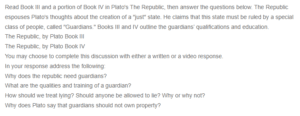The Republic by Plato – Qualifications and Education of the Guardians
The Republic’s Need for Guardians
In Plato’s The Republic, Book III, and IV, Socrates argues that a just state requires guardians with the knowledge and virtue to maintain an ordered and harmonious society. Guardians are responsible for preserving the common good and defending the state against external and internal threats (Plato, 120-121). They must possess specific qualities and training in order to fulfill their duties as the elite class.
Qualities and Training of a Guardian
The qualities of a guardian include wisdom, courage, and moderation. Wisdom is necessary to understand the principles of justice and knowledge of the state’s needs. Courage, on the other hand, is needed to defend the state from foreign and domestic threats. Moderation is essential in their behavior and desires, ensuring that they are not arrogant and do not abuse their power.
Guardians’ training begins early, focusing on music, physical education (i.e., gymnastics and military training), and literature (Plato, p.141-167). As they grow older, they study arithmetic, astronomy, and geometry to develop their reasoning and critical thinking abilities. This training aims to create well-rounded individuals who possess the qualities necessary for their role as guardians.
Concerns About Lying
Regarding lying, Plato argues that it is never acceptable, even if the intention is good. Guardians must be truthful as they are responsible for protecting the common good and public trust. Plato believes that lying leads to mistrust and confusion, ultimately undermining the stability of the state.
Plato’s Statement about Guardians Owning Property
Plato contends that guardians should not own property to avoid conflicts of interest and prevent the accumulation of wealth and power. It is not appropriate for those responsible for maintaining the common good to act in their self-interest, as this would be detrimental to the state’s stability. Instead, guardians should only possess the essentials required to perform their duties effectively (Plato, p.123).
In conclusion, the concept of guardians in Plato’s Republic is crucial to creating a just and balanced society. They possess specific qualities and training to fulfill their duties effectively and truthfully. The idea that guardians should not own property supports their selflessness and dedication to the state’s common good.
Work Cited
Plato. “Jowett’s Translation of Plato’s Republic, 3rd Ed.—a Project Gutenberg EBook.” Gutenberg.org, 2017, www.gutenberg.org/files/55201/55201-h/55201-h.htm.
ORDER A PLAGIARISM-FREE PAPER HERE
We’ll write everything from scratch
Question

Discussion – The Republic by Plato
Read Book III and a portion of Book IV in Plato’s The Republic, then answer the questions below. The Republic espouses Plato’s thoughts about the creation of a “just” state. He claims that this state must be ruled by a special class of people, called “Guardians.” Books III and IV outline the guardians’ qualifications and education.
The Republic, by Plato Book III
The Republic, by Plato Book IV
You may choose to complete this discussion with either a written or a video response.
In your response address the following:
Why does the republic need guardians?
What are the qualities and training of a guardian?
How should we treat lying? Should anyone be allowed to lie? Why or why not?
Why does Plato say that guardians should not own property?

